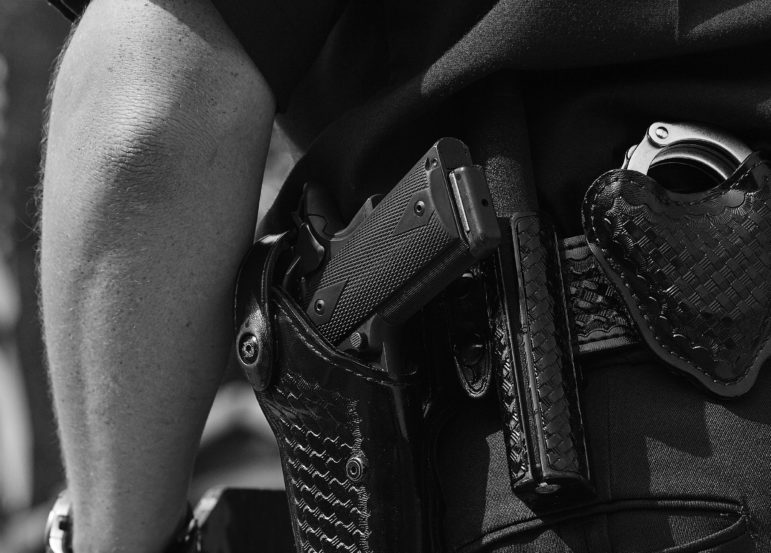
Garrett Wilber
'Having served myself, I understand and share the legitimate concerns officers have regarding their and their families’ personal safety and privacy. Unfortunately, 50-a actually does very little to protect officers.'
Police secrecy does not make New Yorkers – including police officers – safer. Throughout the two decades I served as a New York City Housing Police and later an NYPD Captain, establishing trust in the community was always key to my safety and that of others, both civilian and police. That is why I am calling on the New York State legislature to act and finally repeal 50-a before this session ends on June 19th.
50-a is a New York state law that says that “personnel records used to evaluate performance” of police, fire, and corrections officers “shall be considered confidential” and cannot be shared with the public. This means that 50-a prevents the public disclosure of a police officer’s “personnel records,” even if those records reflect police misconduct. It is arguably one of the worst police secrecy laws in the country and shamefully, it is still in the books in Albany.
In recent years, police departments across New York have used 50-a when refusing to release basic information about police misconduct to the public, such as outcomes of misconduct investigations and disciplinary proceedings – and even general departmental policies. These actions have resulted in an ever-expanding definition of “personnel records” that has enabled police departments and municipalities across New York to hide from public view abusive officers’ misconduct and disciplinary information.
Having served myself, I understand and share the legitimate concerns officers have regarding their and their families’ personal safety and privacy. Unfortunately, 50-a actually does very little to protect officers and actually makes them less safe by eroding public trust. By shielding officers who engage in wrongdoing – even when it results in serious harm or death – from robust and transparent disciplinary processes, departments are protecting officers who have demonstrated an alarming lack of regard for the laws they are meant to uphold. This further erodes the trust between communities and police departments – and that makes the work of other members of service that much more difficult.
Consider how 50-a has been wielded by Mayor de Blasio and the NYPD in the high-profile Eric Garner case. In 2015, a state court ruled that a summary of misconduct findings against the officer who killed Garner could be released and that 50-a did not apply. Yet the de Blasio administration sought an appeal to a higher court, effectively choosing to protect the officer instead of releasing crucial information about the misconduct to Garner’s family and the public. These kinds of actions signal to New Yorkers that the department was willing to defend an officer with a storied misconduct history, in a case where there was blatant wrongdoing. That in turn hurts the legitimacy of the police department in the same communities who we rely on to do our jobs effectively.
While a member of the former New York City Housing Police, I developed training materials designed to improve police – community relations. Without it, police simply cannot do their job and neither they nor the people they serve can be safe. Transparency is a key component to building that trust.
Get the best of City Limits news in your inbox.
Select any of our free weekly newsletters and stay informed on the latest policy-focused, independent news.
Given that Democrats are in control of state government for the first time in a decade, they have both an opportunity and obligation to get rid of our state’s harmful police secrecy law – which has endangered New York’s communities.
As someone who believes deeply in the mission of law enforcement, I strongly believe that repealing 50-a is the best path forward not only for police transparency and accountability, but also for increasing public safety throughout New York.
Now is the moment for state legislators and Governor Cuomo to get it done.
Rev. Karyn Carlo is a pastor, social justice activist, educator, and retired NYPD captain.









3 thoughts on “Opinion: New York’s Police Secrecy Law Endangers Our Communities”
As a former NYCHA employee, I read this piece with alarm. If secrecy goes for police, it will soon go for every single muncipal, state or federal employee. I sure wouldn’t want my personnel records as a former NYCHA employee to be made public there may be some things in there that I’d find embarrassing even 35 years after I worked there, and I’m sure 99 percent of my former colleagues (wherever they are today) would agree.
That’s actually one of the issues with this law, Raanan — it provides a layer of secrecy to some employees but not others. Cops, firefighters, correction officers and emergency medical technicians are covered. Everyone is not. We discovered the law several years back when we set out to see cop disciplinary records after Bloomberg had released those for teachers.
https://citylimits.flywheelstaging.com/2011/01/24/teachers-are-fair-game-but-cops-records-are-off-limits/
I’d also note that the issue here is not personnel records writ large, but disciplinary records specifically. And there is a longstanding tradition of public-sector workers being subject to more public scrutiny than private-sector workers (e.g. your salary, civil service test scores, etc, are already public).
While this seems like a no brainer, a question I have is how many complaints are legitimate? What if someone is upset that they are getting arrested and decide to make a false claim that something happened when it didn’t? That officer would then have a mark on their record for some false claim. There needs to be some sort of checks and balances here. While body cameras would be ideal, to my knowledge not all officers have cameras yet.